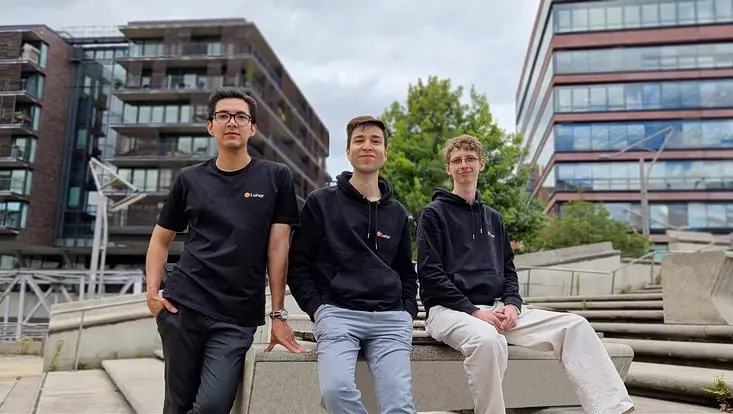With its innovative AI-supported visual aid, the Hamburg-based startup Lunar aims to make everyday situations easier for blind people and strengthen inclusion. To this end, the three alumni of the University of Hamburg, Lukas Ganss, Alejandro Poiqui, and Timon Pitz, have received EXIST funding from the Federal Ministry for Economic Affairs and Energy (BMWE), co-financed by the European Social Fund (ESF), and can now concentrate on further developing their portable AI device.
How did the idea come about?
The idea for a visual aid for blind people was triggered by an everyday situation. Lukas met a blind person at a bus stop who was searching in vain for updates on canceled trips during the farmers’ strike. Despite many technical advances, there was no practical solution for blind people to easily and reliably find their way around in everyday life.In the master’s module “Digital Innovation Lab,” where the three students met, they continued to work on their idea and laid the foundation for their prototype LV01. LV01 is a modular, portable AI visual aid that converts visual information into natural audio output. A small camera on the head scans the surroundings, a button on the white cane, for example, activates the process, and seconds later the AI provides a clear description of the scene – focusing on information relevant to the person. The audio output is delivered via speakers or personal hearing aids, such as Bluetooth headsets and thus helps them find their way around new environments. This enhances the independence and autonomy of blind and visually impaired people and contributes to improving their quality of life.
What distinguishes Lunar from other solutions?
According to Alejandro Poiqui, Lunar’s technology and design rely on the latest generative AI, precise text-to-speech, a modular, scalable device architecture, and an ergonomically lightweight feel. An offline mode is in the works to enable use in airplanes or tunnels, for example. The lower cost of LV01 compared to other providers is another aspect that could be an advantage for the young company.
Versatile support from the start-up ecosystem
It all started at the Digital Innovation Lab, where the three master’s students were supported in the development of their prototype by Prof. Dr. Jan Recker’s team. Successful acceptance into the Ideation Batch at AI.Startup.Hub provided further inspiration and marked the next step on the path from university project to start-up maturity.
EXIST funding as an accelerator
On the way to receiving funding, the three founders received valuable input in the preparation of the EXIST application from Juliane Mietke, start-up advisor at Startup Port@UHH, and Imme Godthardt, former start-up advisor and now Managing Director of the University of Hamburg Business School. Since October, the funding has enabled the founders to devote themselves 100 percent to the product.
Of course, there were also challenges. In the beginning, it was not easy to obtain user feedback in terms of logistics and time. The founders also found acquisition and on-site testing challenging. These challenges were ultimately overcome through online meetings, letters of intent, and partnerships with associations for the blind. For Timon Pitz, it was particularly challenging to bring the team’s respective visions for the future of the product and the company into alignment, as well as to find a clear point of differentiation from the competition through innovation.
The next steps
The plan is to launch the product in the fourth quarter of 2026, accompanied by increased cooperation with associations for the blind and visually impaired in order to gather feedback and further improve the product. At the same time, an internal AI tool could open up further fields of application and support Lunar’s development.
The interview article first appeared on the University of Hamburg website: Alumni develop AI-supported visual aid for the blind: University of Hamburg Business School: University of Hamburg

